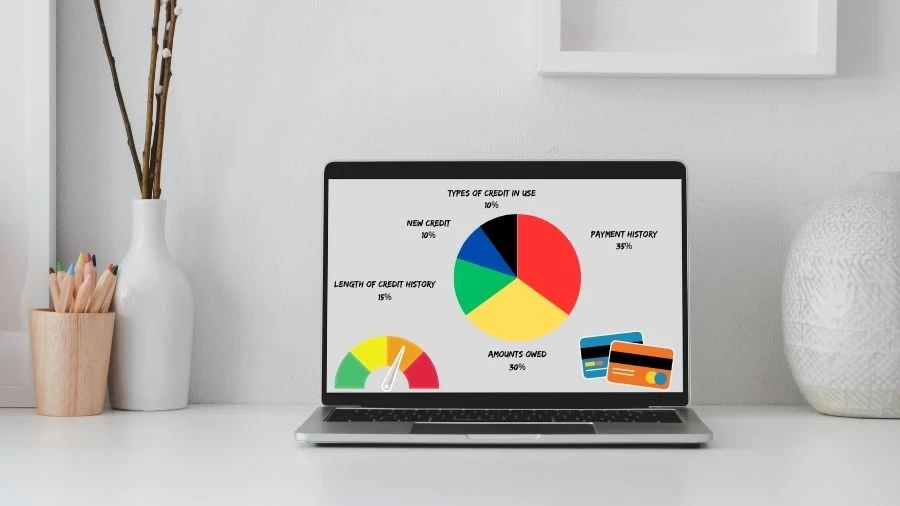
What are 5 Factors that Affect a Credit Score?
Five key factors that affect your credit score include payment history, amounts owed, length of credit history, new credit, and the types of credit in use. These factors collectively influence your overall creditworthiness.
Published Oct 17, 2023 | Updated Oct 17, 2023 | 📖 5 min read
What is a Credit Score?
A credit score is a three-digit number, typically ranging from 300 to 850, used by lenders to assess your creditworthiness. It's based on information provided by lenders to major credit bureaus like Equifax, Experian, and TransUnion. Higher credit scores, such as 800-850, indicate better creditworthiness, making it easier to qualify for loans and credit with favorable terms. Conversely, lower scores, like those below 670, may result in less favorable lending terms.
|
Credit Rating |
Credit Score Range |
|
Exceptional |
800-850 |
|
Very Good |
740-799 |
|
Good |
670-739 |
|
Fair |
580-669 |
|
Poor |
579-300 |
What are 5 Factors that Affect a Credit Score?
Credit scores, typically ranging from 300 to 850, are created by major credit agencies, with FICO Score 8 being commonly used. It's essential for financial stability, managing credit responsibly, and is reviewed by lenders when you apply for loans or credit. Closing paid-off credit card accounts may not be advisable as it can affect your credit history positively. Various credit scores, such as VantageScore, are also used by lenders. The five main factors that influence your credit score are:
- Payment History: This reflects whether you've made your payments on time and is a significant part of your credit score.
- Debt-to-Credit Ratio: It's the amount you owe compared to your credit limit, impacting your score. A lower ratio is better.
- Length of Credit History: The longer your credit history, the better, as it provides more data for assessment.
- New Credit: Opening multiple new credit accounts in a short time can lower your score.
- Amount of Credit: The total credit you have, which should be managed responsibly to maintain a good credit score.
Payment History: 35%
Payment history is the most critical factor impacting your credit score. It assesses your track record of repaying borrowed funds. Key elements considered in this category include:
- Timeliness of bill payments for each credit account on your report. Late payments have a negative impact.
- The degree of lateness: 30 days, 60 days, or 90+ days. The longer the delay, the more it harms your score.
- Accounts that have gone to collections, signaling potential repayment issues.
- Incidents like charge-offs, debt settlements, bankruptcies, foreclosures, lawsuits, wage garnishments, liens, or public judgments on your record are highly detrimental to your creditworthiness.
- The credit score deduction depends on the time elapsed since the last negative event and the frequency of missed payments. For instance, someone who missed several credit card payments five years ago is viewed as less risky than an individual who recently missed a substantial payment.
MarketsHost offers a rich resource of information on Banking, covering Credit Cards, Loans, and other financial topics.
Amounts Owed: 30%
The FICO Score 8 evaluates your credit utilization ratio, which compares your outstanding debt to your available credit limits. This is the second most significant factor and considers:
- How much of your total available credit you've utilized. High credit utilization suggests an inability to handle more debt.
- The balances on different types of accounts, such as mortgages, auto loans, credit cards, and installment accounts. Maintaining a mix of credit types and managing them responsibly is favorable.
- Your total owed amount and how it relates to the original installment account balance. Less debt is better; for example, having a $50 balance on a credit card with a $500 limit appears more responsible than owing $8,000 on a credit card with a $10,000 limit.
Length of Credit History: 15%
Creditors consider the duration for which you've been using credit. They look at how many years you've had credit obligations, the age of your oldest account, and the average age of all your accounts.
While a longer credit history is advantageous, this factor carries less weight because borrowers with shorter histories can demonstrate their ability to make timely payments and maintain low debt.
That's why some financial experts recommend keeping old credit card accounts open, even if they're not in use. The age of these accounts, by itself, contributes positively to your credit score. Closing your oldest account could potentially lower your overall credit score.
New Credit: 10%
Your FICO Score 8 takes into account the number of new accounts you've opened. It examines both recently applied-for accounts and the timing of the most recent account you opened.
Each time you apply for a new line of credit, lenders typically perform a hard inquiry, which involves scrutinizing your credit information during their decision-making process. This is distinct from a soft inquiry, like when you check your own credit.
Hard inquiries can lead to a minor and temporary dip in your credit score. Why? The score assumes that if you've opened numerous accounts recently and they make up a significant portion of your total accounts, you might pose a higher credit risk. This is because such behavior often correlates with financial difficulties or plans to accumulate more debt.
Credit mix: 10%
The last factor that the FICO Score formula takes into account is the diversity of credit types you use, including credit cards, store accounts, installment loans, and mortgages. It also considers the total number of accounts you have.
Given that this factor makes up a relatively small part of your score, you need not be concerned if you lack accounts in all these categories, and it's generally not advisable to open new accounts solely to diversify the types of credit you have.
How to Check the Credit Score?
To check your credit score, you have various options that won't harm your credit rating. You can request a free FICO Score every month through Experian, sign up for LendingTree for access to your free credit score, or check with your bank or credit card company, as they might provide this service for free.
You can also obtain free credit reports from Experian, Equifax, and TransUnion through AnnualCreditReport.com, and during the COVID-19 pandemic, you can check your reports weekly until the end of 2023. Regularly reviewing your credit reports can help spot potential fraud, identity theft, and errors affecting your credit score.
What are 5 Factors that Affect a Credit Score - FAQs
1. How do hard inquiries impact my credit score?
Hard inquiries can cause a temporary drop in your credit score, typically by a few points.
2. Will closing a credit card account hurt my credit score?
Closing a credit card account can reduce your credit score, especially if it's one of your older accounts.
3. How long does negative information, like late payments, stay on my credit report?
Most negative information, such as late payments, remains on your credit report for seven years.
4. Does checking my own credit score affect it?
No, checking your own credit score is a soft inquiry and does not impact your credit score.
5. Can a good credit mix offset other negative factors?
While a diverse credit mix can be beneficial, it won't completely offset other negative factors in your credit history.




